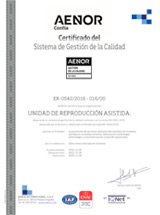The Reproduction Unit Vistahermosa has collaborated on a national multicentral study that has analysed data of more than 500 couples.
Around 30% of the infertility problems are due to genetic causes and in more than the half, the cause is the man. This is the reason of the performance of a multicentral genetic study, i.e. carried out by some Spanish assisted reproduction units. The Department of Genetics of the Reproduction Unit of Clínica Vistahermosa took part in this study, which is directed by Dr. Joaquín Rueda.
The study, coordinated by Dr. Rueda and expounded in the 9th Cytogenetics Conference in Dublin, concludes that “the males with genetic altered sperm, studied through FISH, have less possibilities to create normal embryos”.
To perform this investigation, patronized by the Spanish Association of Private Assisted Reproduction Clinics (ANACER), they have contrasted genetic data of more than 500 couples with the male factor altered from seven Spanish centers.
Joaquín Rueda specifies that “when there are chromosomal alterations in the sperm, the embryos tend to be anomalous, so the success rate for the pregnancy decreases considerably. Nevertheless, the new techniques of preimplantation screening through arrays ease these alterations”.
For the performance of this study, more than 50 data of every couple were collected to know the global clinical utility of the sperm analysis, macroscopically and microscopically, according to parameters of sperm count, motility and morphology, taking advantage of the correlation between the results of this analysis with the clinical data of the couple and the results of assisted reproduction.
“The data collection includes sperm parameters, the fertilization rate, the embryo quality, the development and pregnancy rate and the miscarriage rate”, explains the geneticist from Alicante, who points out that “the validity of this investigation is precisely the criteria unification of different reproduction units of our country, because this is what gives veracity about the success rate in these cases”.










